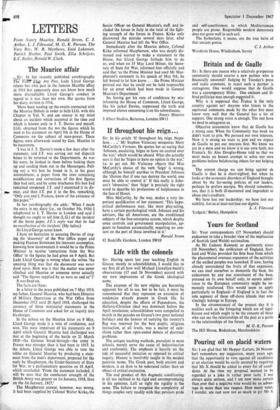Life with the colonels
Sir: Having spent last year teaching English in Greece, mostly to schoolchildren, I would like to say first of all how well Michael Llewellyn-Smith's observations (17 and 24 November) accord with my own impressions of the Greek ideological scene.
The excesses of the new regime are becoming apparent for all to see, but to be fair, it must be remembered that they represent an extension of tendencies already present in Greek life. In education, despite the efforts of Papandreou, the Hellenic-Christian ideal was dominant before the April revolution; schoolchildren were compelled to march in the parades on Greece's two great national holidays and the honour of carrying the country's flag was reserved for the best pupils; religious instruction, at all levels, was a matter of cate- chism rather than open-ended debate of doctrinal problems.
The antique teaching methods, prevalent in most schools, merely serve the cause of indoctrination and conformity. The emphasis is heavily on the side of successful imitation as opposed to critical inquiry. History is inevitably taught in the modest patriotic terms. The Greek past, both ancient and modern, is an ikon to be venerated rather than an object of critical evaluation.
The end product of this dogmatic conditioning is all too inclined to be rigid and uncompromising in his opinions. Left or right the rigidity is the same. The failure to recognise the complexity of things couples very readily with that petulant pride and self-assertiveness to which Mediterranean people are prone. Responsible modern democracy does not grow well in such soil.
The barbarians, it seems, are the true heirs of that ancient genius.
C. I. Arthur
Woodcote House, Windlesham, Surrey


































 Previous page
Previous page